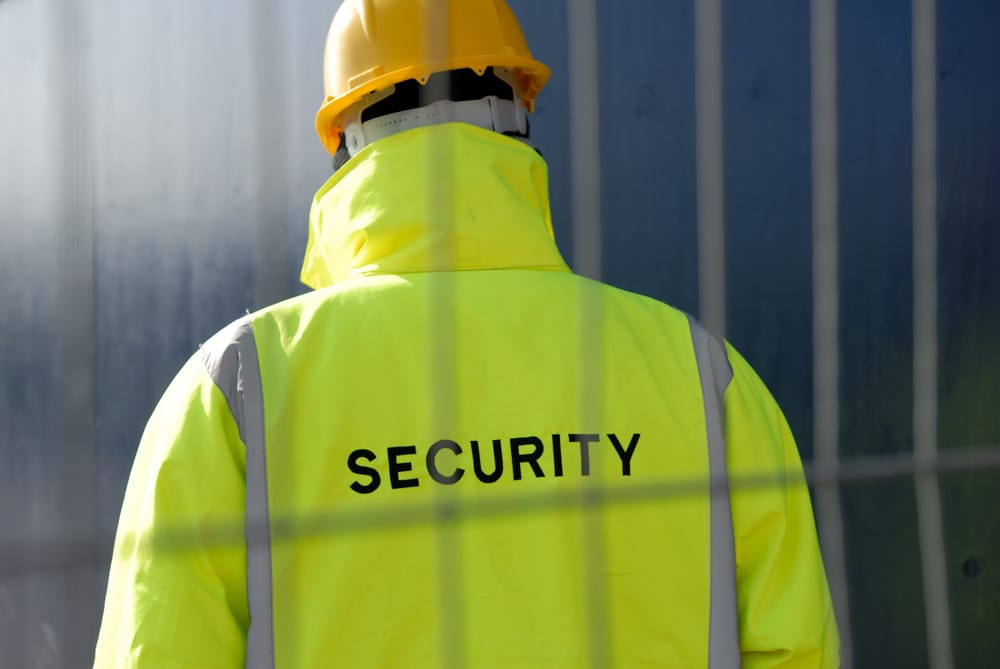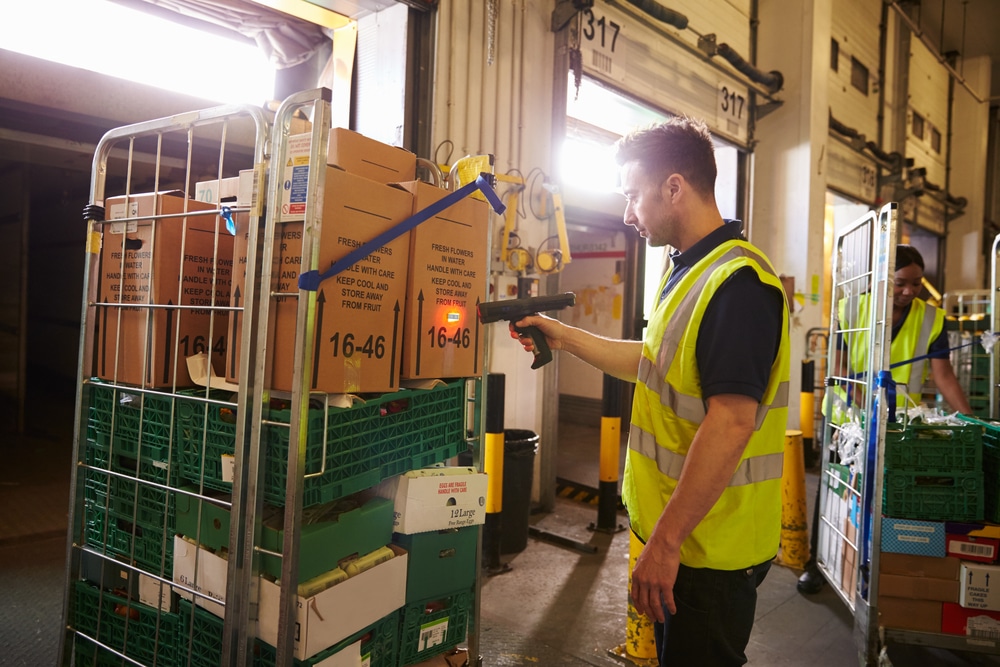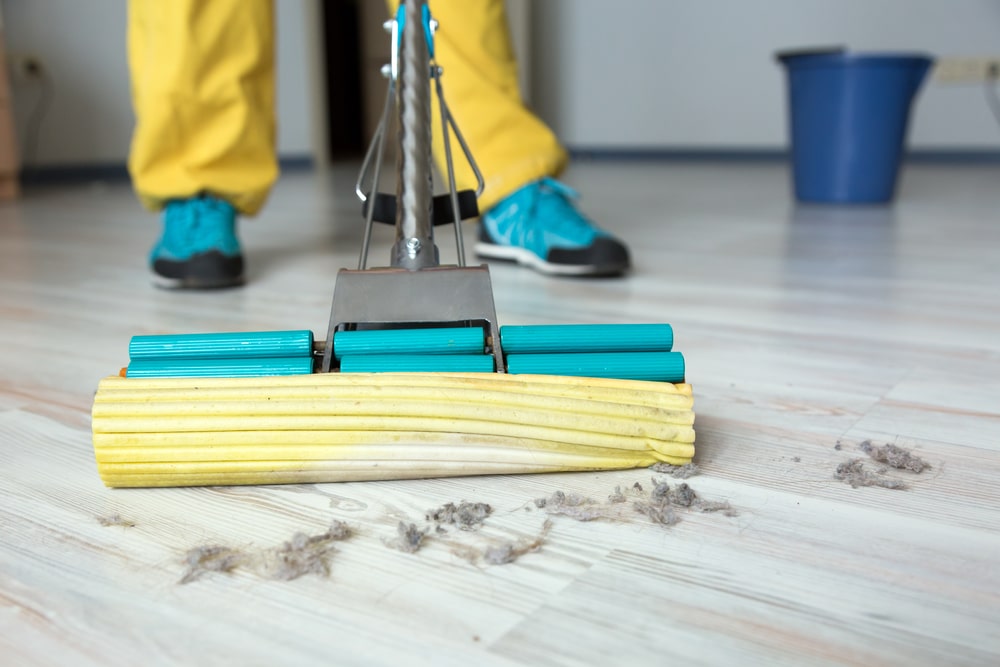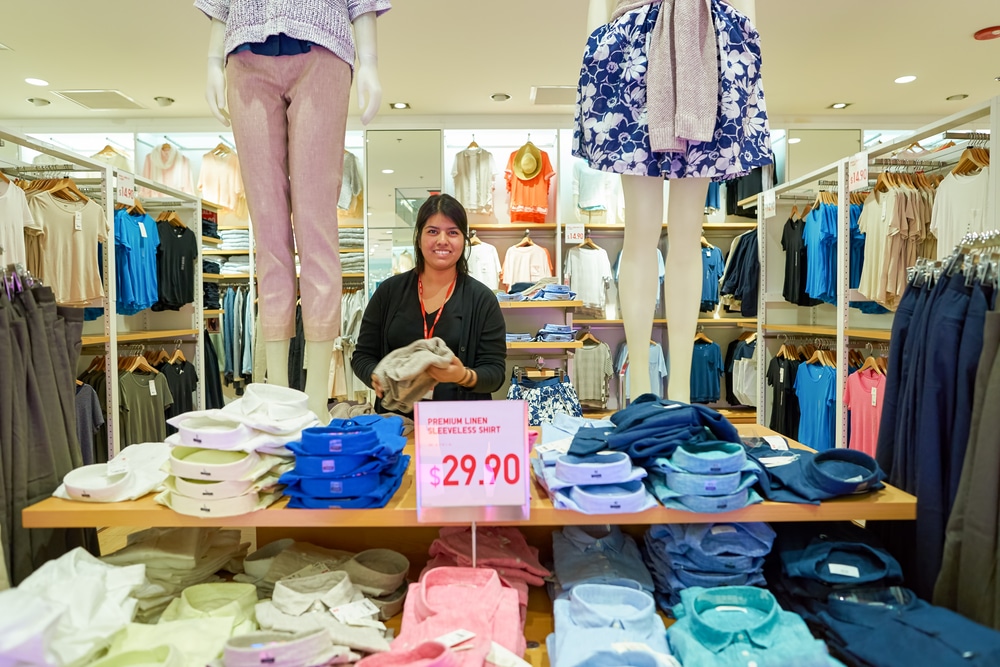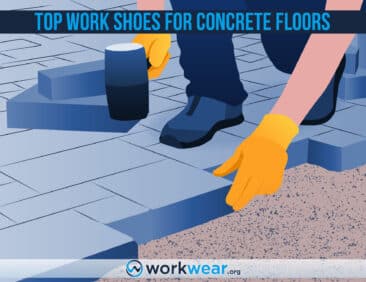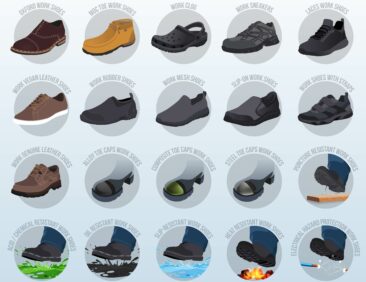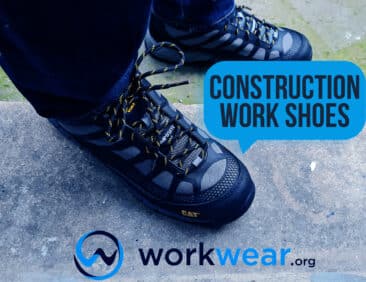Jobs that Involve Working and Walking on Concrete Floors
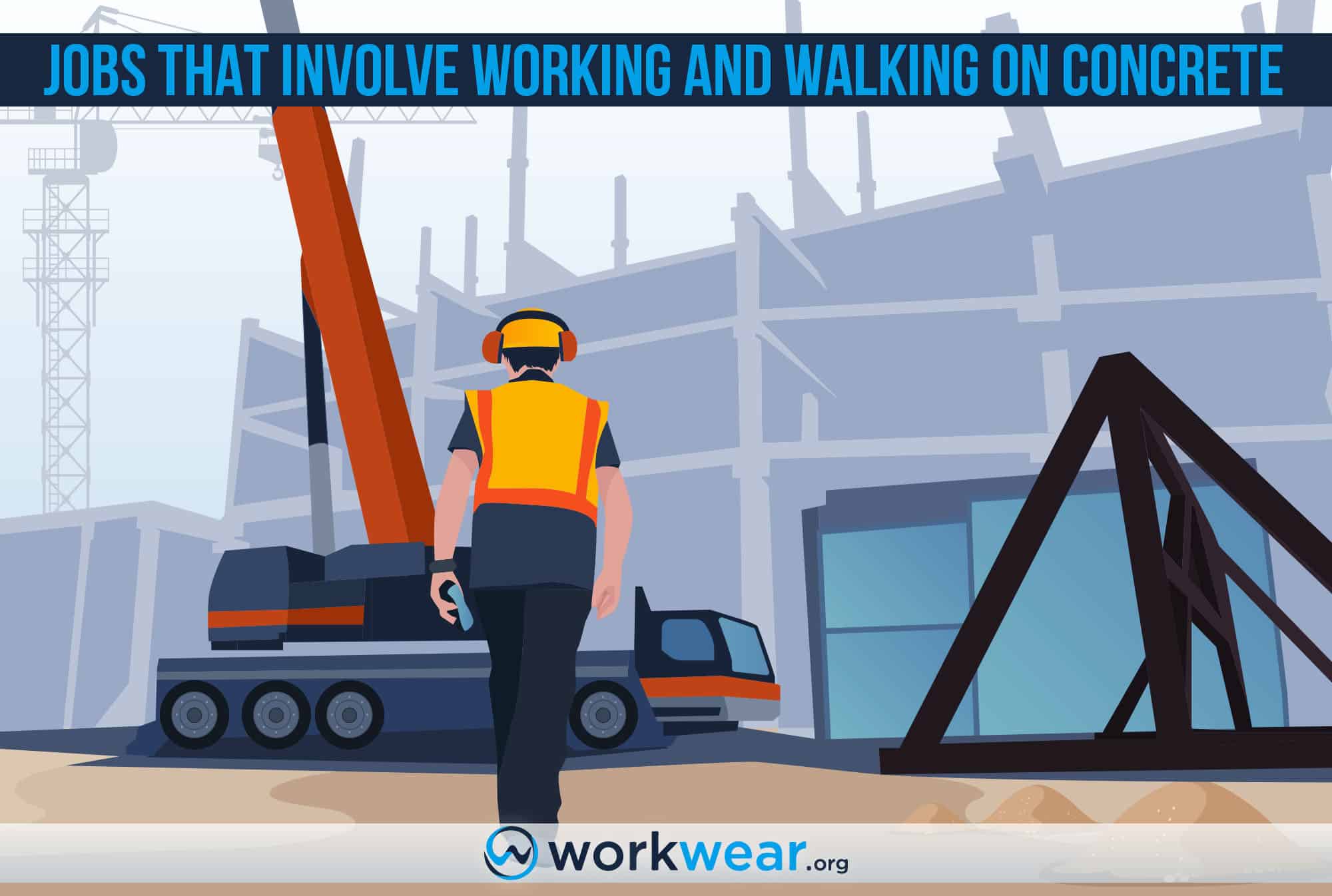
Staying upright for prolonged periods can lead to foot and leg pain. The problem is magnified for jobs that involve working and walking on concrete floors. Continuous steps on the hard ground result in substantial impact, mostly absorbed by foot muscles, knees, and hips. To help prevent the negative (and long-term) impacts of walking on unyielding surfaces, it’s crucial to choose appropriate work footwear with the right features.
In this article, we’ll be exploring jobs and professions that involve walking and working on concrete floors – including the related work conditions requiring boots and shoes which can protect against severe discomfort.
Features of High-Quality Work Footwear for Working and Walking on Concrete Floors
Shock Absorbent – Work footwear with good shock absorption can make walking on concrete floors much more comfortable. Cushioned insoles and midsoles can absorb most of the impact of walking, saving the feet from much pain.
Strong Arch Support – Work boots and shoes need sufficient arch support to prevent the arches from falling, which can be a risk when walking or standing for extended periods on concrete floors.
Lightweight – Lightweight footwear doesn’t drag the feet down with extra bulk, minimizing the discomfort that can be felt when walking on unforgiving concrete floors for long hours.
Breathable – Walking and staying upright on concrete floors can strain the feet, making them more susceptible to profuse sweating. Breathable footwear keeps the feet fresh and dry, especially in hot work environments.
Slip Resistant – Smooth concrete floors can be tricky to navigate but slip-resistant footwear can grip the surfaces better, enabling a safer experience with improved walking stability. The strong traction can keep up with concrete floors that become slippery when wet or layered with fine debris (such as dust or wood shavings).
Durable – The impact of walking on unyielding concrete floors can take its toll on footwear, with weaker materials easily showing signs of deterioration before long. However, durable work boots and shoes can preserve their appearance and function much longer as they’re more damage-resistant.
Jobs that Involve Working and Walking on Concrete Floors
Security Guards
Security guards spend the entire shift on their feet on hard floors. They may be assigned to stay in one place for hours or roam specific areas that are assigned to them.
Either task involves nonstop standing or walking on concrete floors and can lead to much discomfort.
Security guards will benefit from using non-bulky tactical boots with shock-absorbent qualities, making their tasks more comfortable to manage but not compromising their agility.
Food Service Staff/Waiters
Food service staff frequently walk to the dining area from the kitchen and vice-versa, moving quickly to give the dining customers their orders in a timely fashion.
During the busiest hours at lunch or dinner, the staff may be required to walk back and forth on the concrete floors continuously for hours.
Comfortably cushioned footwear with impact absorption and slip resistance can make movements more efficient while fighting foot fatigue.
Those with lightweight styles will also be easier to move around since they don’t feel too bulky to carry around all day.
Kitchen Staff/Professionals
Kitchen staff go about their entire shifts (and sometimes even longer) on their feet – while preparing ingredients as well as for the actual cooking process.
In professional kitchens, the staff members spend hours either standing in their designated stations or walking around to do their respective tasks.
Work footwear with ample padding and arch support keeps the feet comfortable, while slip resistance and breathability offer protection against slipping and overheating in hot kitchen settings.
Warehouse Workers
Working in warehouses usually involves moving products, boxes, and other items from one area to another.
Doing so requires walking on concrete floors for hours, and the remaining time may be spent standing on hard surfaces to do inventories and other inspections.
Warehouse workers need work footwear to protect their feet against the brutal impact of walking on concrete floors.
These work boots and shoes are built with comfortable padding and shock absorption, helping the feet stay comfortable even with the additional burden of carrying heavy items.
They often come with lightweight structures that won’t weigh the feet down even after all-day use.
Nurses/Healthcare Workers
Nurses are always on their feet to attend to patients’ needs. They spend almost all day walking on hard floors to respond quickly to urgent situations, so they need footwear matching their agility.
Lightweight work footwear choices with shock absorption make it easier for nurses and other healthcare workers to move nimbly on their feet while also preventing the onset of extreme discomfort.
The floors in hospitals and other healthcare facilities can become quite slippery, so slip resistance is also a must for work footwear to be used in such conditions.
Cleaning Personnel
Cleaning staff members spend their days either focused on specific areas that need to be cleaned or walking around to check that other sections are cleaned or sanitized as required. These workers often do their jobs walking or standing on concrete floors for entire shifts concentrating on the cleaning process.
Shock absorption and strong arch support are crucial in work footwear for these workers, who will also benefit from durable, slip-resistant shoes or boots that can keep up with challenging environments.
Construction Workers
Construction workers face some of the toughest conditions on the job.
Aside from the substantial impact of walking on concrete floors, workers’ feet are also at risk of being crushed by heavy falling objects around the work area.
High-quality work footwear for construction work need to have safety toe caps, as well as other enhancements (including arch support, shock absorption, and slip resistance) for improved foot comfort and safety on the job.
They must also be durable enough to last through all-day use on hard surfaces while doing strenuous construction tasks.
Couriers/Delivery Personnel
Couriers go about their daily duties while walking on concrete floors – including in delivery hubs where the packages are picked up and on to the recipients’ homes or workplaces. Additional walking on outdoor concrete surfaces may also be required for successful delivery.
Couriers need work footwear with strong arch support and shock absorption to make walking on concrete floors more bearable while carrying heavy items.
Slip resistance and durability are also crucial for the footwear to keep up with constant walking in variable ground conditions.
Manufacturing/Factory Workers
People who work in factories and manufacturing plants often spend their time walking or upright in stationary positions on concrete floors.
The feet and legs bear the body’s weight for long hours and are exposed to even higher risks of injuries or chronic pain when walking on unforgiving floors.
The right footwear with ample padding and arch support can cushion the feet, keeping them comfortable even with all-day walking on concrete floors.
Strong slip resistance, durability, and lightweight structures will also make the work in factories and manufacturing sites more manageable and comfortable.
Retail Sales Staff
Working in retail sales involves standing in the same position for long hours while either overseeing the merchandise or speaking to customers. The workers may also need to walk on concrete floors for restocking or inventory purposes constantly.
Working and walking on concrete floors can strain leg and foot muscles and joints, so it’s important to have footwear to soak up the impact of moving over such unyielding surfaces.
Personal Testing Experience
We had the chance to test a pair of work shoes and work boots which performed exceptionally well for working and walking on concrete floors. The Timberland Reaxion Work Shoe uses an exclusive Anti-Fatigue technology to absorb the shock of walking on concrete floors, with generous cushioning creating a comfortably soft base. It’s breathable and moisture-wicking, preserving a fresh foot environment for longer as moisture and sweat escape quickly. The shoe’s laces are a bit thin and may not be as sturdy as thicker material. On the other hand, the Puma Safety Conquest CTX Waterproof Comp Toe Boot is built with an ergonomically-designed footbed offering continuous pressure relief while walking on concrete surfaces. It has a lightweight structure doesn’t drag on the feet even after hours of use. The shoe’s waterproof yet breathable lining prevents uncomfortable warmth and wetness from overwhelming the feet, although the upper can be difficult to clean.
Conclusion
Working and walking on concrete floors all day, every day, can lead to uncomfortable experiences and lasting pain. Yet, moving or staying on such unforgiving surfaces can’t easily be avoided for some jobs because these may be required to get the job done efficiently. Work boots and shoes with reduced weight, reliable arch support, strong shock absorption, breathability, slip resistance, and durability will be useful in promoting comfort and efficient movements while working and walking on concrete floors. These footwear choices will help workers in the food industry – such as food service staff or servers, kitchen staff (including chefs and cooks) – and those working in healthcare (including nurses) who are constantly on the go on concrete floors. Retail sales staff, security guards, couriers, and cleaning personnel spend their days walking on unyielding concrete floors, along with other jobs, including warehouse workers, construction workers, and those who work in manufacturing plants or factories.
FAQs
- Are shoes or boots with flexible soles suitable for working and walking on concrete floors?
- Flexible soles are ideal for working on concrete floors if the job requires continuous walking and other tasks that require the feet to flex easily – such as kneeling, bending, or getting into tight spaces. It’s equally important for the soles to be cushioned and impact absorbent for improved comfort while walking on hard ground conditions.
- Why is slip resistance important when walking or working on concrete floors?
- Concrete floors can become slippery when wet or strewn with fine debris (such as dust). Work shoes and boots have a firm grip on tricky surfaces, keeping the feet planted securely to maintain one’s balance to prevent slipping.
- Do thick soles perform better for working and walking on concrete floors?
- In general, yes. A thick sole offers a denser cushioning layer that softens continuous steps’ impact on hard concrete. It can also absorb and then distribute the impact much better, so it doesn’t get soaked up by the feet and leg muscles. Thicker soles are typically more durable, enabling the footwear to last longer through the constant beating from walking on concrete floors.
- Are flat soles good for walking or working on concrete floors?
- Flat soles may not provide arch support for comfortable walking on concrete floors. As much as possible, look for work boots or shoes with curved insoles – or at least with strong arch support – to prevent the arches from falling and keep the feet cradled in their proper positions.
678+
Products Reviewed
24+ Years
Combined Experience
500+ Hrs
Field Testing
